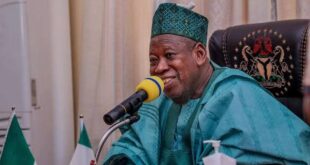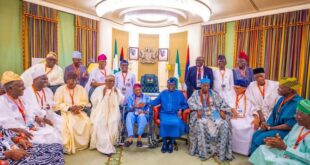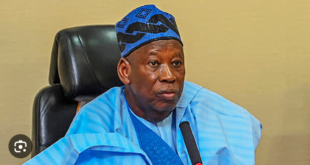In that threat to buy Atiku cows, so that he could return to the traditional profession of his kith and kin, was Shettima making tribal denigration or affirming ethnic ascendancy or supremacy?
In all, Shettima’s walk down the aisle of inappropriate imageries and anecdotes does not portray him as the cultured book-reading Northern leader that he has struggled all this while to convey. On the reverse, it casts him in the mould of the disappointment encountered by Yoruba elders from men who were expected to mirror sterner stuff of wisdom and civilisation in utterances.
Yoruba have a solemn way of expressing disgust with vacuity. Wherever elders look forward, in huge expectation, that a respected person would utter words of knowledge, ogbon, but its antonym, ago, comes from that otherwise venerated mouth, they are downcast. Conversely, wherever ago is expected and ogbon is manifested, it elicits respect and high acclamation. Recently, American president, Joe Biden, enjoyed a picturesque moment of ogbon. We can recall that, arising from his attempt to overturn the outcome of the 2020 presidential election, President Donald Trump faced trial on a litany of felony charges. His trial was considered a turning point in American legal history. In the process, a historic mug shot of him was released by a Georgia courthouse. It instantly became a global talking issue and a veritable muse for various artistic creations and merchandise. T-shirts, posters, mugs, shot glasses and even bobblehead dolls got creatively embossed with the Trump mug shot. In the shot, the American president was captured donning a red tie, gleaming hair, and wearing his traditional scowl like a visor, showing one who had stepped on excrement. As he stepped out of an exercise session at Lake Tahoe, and was accosted by reporters for his impression of Trump’s mug shot, Biden had smiled and, as reported by Bloomberg, said, “Handsome guy, wonderful guy.”
A “handsome and wonderful guy” remark about an indictee’s mug shot, who is probably on his way to jail, was every inch an unkindest cut. In literature, Biden’s remarks share the same texture with an irony, euphemism or litotes. You could even be pardoned if you call it an antiphrasis, a rhetorical device where one who utters it means the opposite of what he says, in such a way that it is obvious to anyone who hears it what the speaker’s intention is. Western leaders use expressions like this a lot. They are called ice cream words, as opposed to the infelicity of hot, burning reactions that end up promoting hatred, animosity and division. The recipient of the word is hurt as they had been hit right in the middle of their hearts, yet the words appear harmless and gentlemanly. The words say very little, yet send in numerous arrows that pierce the heart of the matter and the soul of their victims.
The Biden path doesn’t excite most Nigerian leaders. They find wisdom in ago. Like last week. Nigeria’s Vice-President Kashim Shettima, against the run of play, had stormed the Appeal Court in Abuja, venue of the Presidential Election Petition Tribunal (PEPT), to witness the delivery of the tribunal judgment. Forget the many insinuationmade about his appearance at the tribunal. Some mischief makers said his presence was meant to make personal eye contacts with the judges. Some said it was to intimidate them. Others said it was a reflection of the certainty of the presidency’s suasion that the result would go its way. Anyway, Shettima sat through the tiresome rigour of waiting to hear the last of the justices’ pronouncements, which lasted for almost a whole day. He was flanked by Umaru Ganduje, party chairman, ministers and the National Security Adviser (NSA).
Presidential candidates of the Peoples Democratic Party (PDP) and Labour Party (LP) in the last 25 February election, Atiku Abubakar and Peter Obi, had appealed against the declaration of the APC candidate in the said election as winner and president of Nigeria. After their Lord Justices had declared the APC candidate winner of the election, Shettima then spoke to the press, haughty, conceited and with an for the bombastic defining his facial features. “We are not going to retire Atiku to Dubai or Morocco. I’d retire him to Fombina. I’d buy him goats, broilers and layers, so that he can spend his days rearing cows and broilers,” he had said of the man who had just been declared loser of the election by the court.
So, was Shettima trying to cast aspersion on Fulani rule, the Kanuris’ historic clash with Uthman Fodio’s Fulani nomads and all they represent? Was it a referencing of today’s “conquest” by Kanuris, manifest in his vice presidency, of the progenies of Fodio, almost two hundred years after Fodio’s hijra and jihad on the animist Kanuris of Bornu? Or was Shettima simply referencing Fombina, the southlands, an earliest name for the emirate south of Bornu and Sokoto? Or the place of the Kanuris who, even in the twelfth and thirteenth centuries, led the famous Kanem Bornu Empire, with a Kanuri leadership of the empire?
Apparently immediately realising the indecency of such outburst, Shettima attempted to apply some soothing balm. He then went into a paraphrased history of what he called the socio-cultural interaction between the Fulanis and Kanuris of northern Nigeria, which he incongruously flaunted as justification for the liberty he took to dress the former vice president in such infelicity. That interaction, Shettima said, was reason why Abubakar could not complain that a far younger but brusque holder of a temporary political power took liberty to dress him in such a despicable robe. “He’d stoically bear,” Shettima said in a re-rendition of Shakespearean lingo.
Shettima manifests this image of a man obsessed with books and knowledge. On a 21 February, 2017 trip to Oslo as governor of Borno State, he had reportedly gone shopping. The Paleet Shopping Centre, a famous mall at Karl Johans gate, opposite the palace of the Norwegian monarchy in the city of Oslo and, in particular, a store called Tanum, was where he headed.
Since appearing on the dais of political leadership in Nigeria, Shettima has struggled to present himself as a polished, urbane and gentlemanly northern politician. A few weeks ago, he was in Ibadan, the capital of Oyo State, for the wedding of Ibukun, daughter of Professor Folusho Okunmadewa, who the VP called “my beloved teacher.” Cosseted on both sides by the state’s Deputy Governor, Adebayo Lawal; Bornu State governor, Babagana Zulumand former Minister of Health,Professor Isaac Adewole, Shettima lauded the ancient city as “a home” and where he learnt to turn everything that comes his way into an opportunity. Waxing and walzing in poetics, the VP dazzled the audience with the ancient lines of John Pepper Clark’s “Ibadan.”
“As I look around this room, I’m not only reminded of a city that has woven its culture, values and aspirations deep into my being, but also of how fate has played a part in expanding relationships and families. I’m privileged to not only draw from this intellectual oasis of the University of Ibadan, but also to identify as a member of the family and as a qualified son of the soil,” he said.
Shettima manifests this image of a man obsessed with books and knowledge. On a 21 February, 2017 trip to Oslo as governor of Borno State, he had reportedly gone shopping. The Paleet Shopping Centre, a famous mall at Karl Johans gate, opposite the palace of the Norwegian monarchy in the city of Oslo and, in particular, a store called Tanum, was where he headed. He had told the store keeper that he needed books and his areas of interest were non-fiction, leadership, biographies, politics, history, economies, education and culture of different societies and nations. A few weeks ago, representing President Bola Tinubu at the 2023 BRICS summit in South Africa, his media aide reported how Shettima took a detour from the conference to a bookstore. He searched the city of Pretoria for books, which the aide said was manifestation of “his unquenchable thirst for books, intellectual curiosity, and insightful perspectives on writers and subjects… topics spanned domains ranging from economics and philosophy to the intricate realm of politics… a personal philosophy regarding acquiring books in the cities he journeyed through.”
While the run-up to the 2023 elections was acquiring feverish pitch, Shettima suddenly epitomised the culture shock that Ugandan poet, Okot p’Bitek, attempted to convey in his famous poem, “Song of Lawino.” Standing in for Tinubu at the Nigerian Bar Association (NBA) conference of 2022, also graced by then presidential candidates, Abubakar and Obi, Shettima was outfitted in an attire that poignantly spoke to his attempts at going off the handle in his acquired self-sureness of Western book knowledge. This was in palpable juxtaposition to the saber-rattling of his war-mongering Kanuri roots. Outfitted in black suit and red tie on top of a pair of gym shoes, Shettima stirred uncomplimentary reactions that froze social media. On his Twitter page, an ex-presidential aide, Reno Omokri had asked, “Who in his right mind wears a suit and tie and then puts on a pair of gym shoes to a conference?”
First published in 1966 in Luo and translated into English, “Song of Lawino” contributed to debates on the place and future of Africa in a world where there is a growing gravitation towards the knowledge of books and abandonment of the values, mores and bequeathals from our African forebears. With pungent graphic metaphor and a grammatical intensity that catches attention of the reader, p’Bitek demonstrates the imminent conflict between modern civilisation and tradition. It was narrated as dialogue between Lawino and her husband, Ocol. Ocol abandons his wife and in the name of Europeanisation marries a woman who is the archetypal European. p’Bitek asks such germane questions about the nature of Africa’s liberation like, should Africans defer to the pre-colonial acquired tradition or adapt to European values? Such conflict must have hit Shettima at the NBA conference.
The reference to cow is even more curious. The Fulani have a historic dalliance with cows. The most notorious of the examples was Muhammadu Buhari who, even as Nigeria’s president, maintained an almost romantic and incestuous relationship with his herd of cattle… In that threat to buy Atiku cows, so that he could return to the traditional profession of his kith and kin, was Shettima making tribal denigration or affirming ethnic ascendancy or supremacy?
Anyway, what exactly was Shettima trying to convey by that queer statement: “We are not going to retire Atiku to Dubai or Morocco. I’d retire him to Fombina. I’d buy him goats, broilers and layers, so that he can spend his days rearing cows and broilers?” Was he in a way making reference to Derek Walcott’s “Goats and Monkeys,” one of the poems in the collection, The Castaway and Other Poems? Derek Alton Walcott, a Saint Lucian, West Indies poet and playwright, was a Nobel Prize winner. The poem under reference is a commentary on master-slave relationship and symbolically themed to reflect rulers and the ruled. Reference to goats and monkeys in the poem was an obvious allusion to Shakespeare’s Othello.
The reference to cow is even more curious. The Fulani have a historic dalliance with cows. The most notorious of the examples was Muhammadu Buhari who, even as Nigeria’s president, maintained an almost romantic and incestuous relationship with his herd of cattle, at the expense of the wellbeing of the people he was sworn in to protect. In that threat to buy Atiku cows, so that he could return to the traditional profession of his kith and kin, was Shettima making tribal denigration or affirming ethnic ascendancy or supremacy?
In all, Shettima’s walk down the aisle of inappropriate imageries and anecdotes does not portray him as the cultured book-reading Northern leader that he has struggled all this while to convey. On the reverse, it casts him in the mould of the disappointment encountered by Yoruba elders from men who were expected to mirror sterner stuff of wisdom and civilisation in utterances. If the vice president was seized – seize again! – by the usual Aso Rock spirit of incalculable excitement at the APC win in court, books, tomes of which he is reputed to have stockpiled in his brain, should have taught him the need for précis and culture. None of these did he exhibit outside the Appeal Court on Wednesday.
While Shettima and the APC are celebrating APC’s electoral victory in the court, traditional rukus on the alleged impartiality of the judiciary reigns. The fear of judicial corruption has always surrounded Nigeria’s electoral firmament. It didn’t begin today. The 1979, 1983, 1999 elections, even down to the present time, quaked under quests for electoral justice. Rather than mourn the turn of the face of justice today, we all must opt for an activist fight for a total reform of our electoral laws. For instance, a president who reserves the power to appoint the INEC chairman and its commissioners cannot but retain a rope to manipulate the swings of electoral geography. Let us severe every twine that links the electoral umpire to the presidency. It is key to impartiality.
Second, let us tinker with the constitutional provision which requires a candidate for the office of the Nigerian president to receive just a mere plurality of national votes and over 25% of the votes in at least 24 of the 36 states. Tinubu’s 8,794,726 total votes, representing 36.61%, Atiku’s 6,984,520 at 29.07% and Obi’s 6,101,533, which represents 25.40% of total votes, are too unrepresentative of Nigerians, so much that winners who claim to have been given the legitimacy of office actually have none of it. Between the three of them, they represent a tiny percentage of votes cast and the general population of Nigeria. Anyone who wants to be Nigeria’s president should not score less than 51% of votes cast – the constitutional requirement in many African countries. Those are the issues I think we should address, moving forward.
Festus Adebayo is an Ibadan-based journalist . He wrote this piece and first published in Premium Times
 The Commerce Africa African Reneissance
The Commerce Africa African Reneissance




